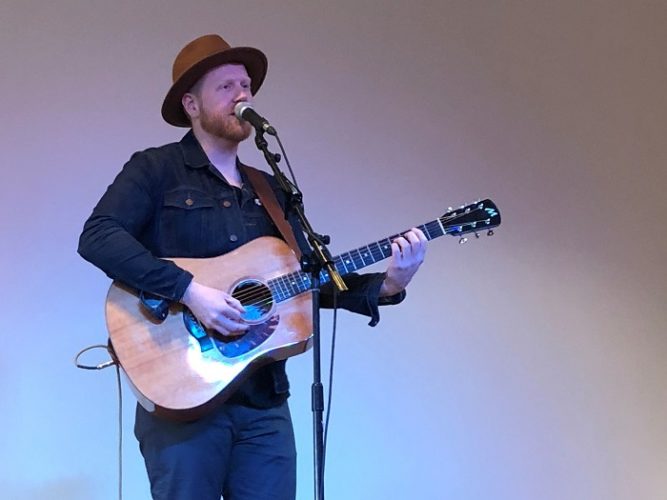 Michelle Keith - The Yellow Jacket
Michelle Keith - The Yellow Jacket In-between sips of water and coffee, Steve Everett filled the Beehive with upbeat melodies during the Student Activities Board hosted Noon Tunes March 14. Everett combined jovial songs with casual banter and engaging jokes that often invoked a round of laughter from the audience.
The Appalachian State University graduate describes himself as a family-friendly, clean act that shares the same morals as the Waynesburg community. Those attributes in combination with his talent has resulted in SAB asking Everett to return to campus for the seventh time.
“The first I came up here, I played for Wing Night and it was just fantastic,” Everett said. “It was packed in [the Bee Hive]. Every chair was taken. All the people that were in here were super into the music and laughed at all my jokes, so I told [Bristor] I’d be happy to come back any time.” This past performance marked Everett’s seventh appearance on Waynesburg’s campus.
“My favorite moments are when the crowd really engages and you can see people realizing, ‘oh I like this’,” Everett said.
Despite not having a favorite song, as he said he is proud of all his work, Everett definitely holds onto a favorite performance: The House of Blues show at Myrtle Beach, South Carolina. Everett opened for Sister Hazel, a band popular in the 1990s. He remembers each detail to this day, from song order, to what people in the front row were wearing.
“They said my name, opened the curtain and there’s 2,000 people,” Everett said. “And they don’t know you’re not famous, so they just go nuts. I remember just this voltage of electricity in my body, and I was just ready. Not nervous, just really, really excited.”
Of course, no artist starts out with high levels of success. For Everett, his musical career is attributed to his father who was an opera singer and a church choir director. By the age of five, Everett was singing and performing in church. Around age 10, he began to write his own songs. It wasn’t until age 15 when Everett started participating in bands.
According to Everett, learning how to play an instrument pushed him into joining his first band. “I bought a guitar at a yard sale for $20. We were poor, so I couldn’t take lessons and I had to teach myself how to play. From 10 to 15, it was just me writing and teaching myself to play. It would’ve been quicker if I had taken lessons, though.”
Everett’s experiences have showed him new things and the opportunity to travel, but everywhere he goes, according to Everett, there is always the same question asked of him.
“People always ask whether you write music or lyrics first,” Everett said. “And really one doesn’t come before the other at all times. I could be sitting in my house, playing guitar just doodling around, and randomly your fingers can just find something that feels good.”
“As a songwriter, you could be in a good mood and write a happy song. You could be in a terrible mood and want to get that out. You know, just any emotion you feel. Once you write a song about it, you capture it and you can move on. Then when you sing that song, you can kind of open it and revisit that emotion, then seal it and put it back away. It’s like a time capsule.”
Everett is proud of the fact he still performs songs he wrote when he was 16. He enjoys looking back on those songs and seeing the progress he’s made, especially when revisiting concepts that he was once dumbfounded by to find he now has a firm grasp on them.
For Everett, that progress and passion is what truly matters in the life of any musician, singer, songwriter, or creator in general.
“Take money and fame out of the equation,” Everett said. “All you should focus on is what you’re in charge of; all you’re in charge of is how good you are at what you do. It’s not merit based, any kind of art. Don’t worry about people understanding it, because the only real value you have are you and who you are.”
Specifically, Everett believes in sticking with personal values and unique characteristics over forcing creativity to take the form of what’s popular right at that moment.
“You can chase fads, but all you do is become a bland version of that thing,” said Everett. “The best thing you can do is find who you are uniquely and be that 100 percent, unapologetically.”
